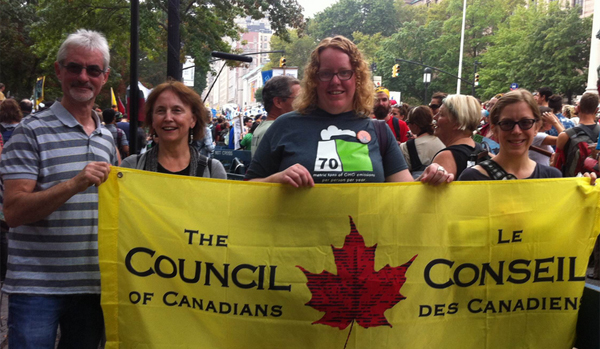The United States and China have come to an agreement on carbon emissions prior to the United Nations climate summit in Lima next month and the critical December 2015 climate talks in Paris. The negotiations on the agreement announced in Beijing by U.S. President Barack Obama and Chinese President Xi Jinping began nine months ago and included a meeting between the two leaders at the UN in New York this past September just after 400,000 people — including Council of Canadians activists — marched on the streets demanding climate action.
In the agreement:
- the United States will emit 26-28 per cent less carbon in 2025 than it did in 2005
- China has said it will stop its emissions from growing by 2030, earlier if possible
- China will derive 20 per cent of its total energy production from renewable energy sources by 2030
NGOs react
The Canadian Press comments, “[It isn’t] clear how either the U.S. or China would meet their goals, nor whether China’s growing emissions until 2030 would negate any reductions in the U.S. Still, the dual announcements from President Barack Obama and Chinese President Xi Jinping, unveiled Wednesday in Beijing, came as a shock to environmentalists who had pined for such action but suspected China’s reluctance and Obama’s weakened political standing might interfere.”
The Natural Resources Defense Council lauded the agreement, Public Citizen says the targets are achievable, while 350.org says “this deal needs to be stronger.” In the coming days there will be fuller commentary from non-governmental organizations on this agreement.
Emerging economies could follow suit
That Canadian Press article adds, “Taken together, the U.S, China and the European Union account for more than half of global emissions, and there were already indications that the world’s next-biggest emitter — India — might be feeling the pressure. Developing nations like India and China have long balked at being on the hook for climate change as much as wealthy nations like the U.S. that have been polluting for much longer. But China analysts said Beijing’s willingness to cap its future emissions and to put Xi front and centre signalled a significant turnaround.”
And on that point, Grist explains, “Thanks to our longstanding development and wealth, the U.S. has produced 29.3 percent of global cumulative carbon emissions, while China has been responsible for only 7.6 percent. What China is planning — starting on a path of renewable development, so that it can transition from fossil fuels as quickly as possible without damaging economic growth — lays out a model for emerging economies such as India, Brazil, and Indonesia to follow.”
New pressure on Harper
Significantly for Canadians, the Wall Street Journal comments, “The plan for the U.S. and China to cut emissions is likely to see Australia and climate ally Canada cast as environmental villains at the G-20 in Brisbane — a role more usually filled by China and fellow developing powerhouse India due to their reliance on coal.”
In June, the Guardian reported, “The Australian and Canadian prime ministers have suggested that economic growth is more important than tackling climate change, playing down the prospects of strong coordinated global action [including at the upcoming United Nations climate summits].” And the Globe and Mail has reported, “Without [new] climate regulations, the [Harper] government forecasts that emissions from the oil and gas sector will soar by 23 per cent between 2005 and 2020, and by 48 per cent by 2030, swamping progress in other sectors.”
Canadian prime minister Stephen Harper, Australian prime minister Tony Abbott and U.S. president Obama will all be at the upcoming G20 summit in Brisbane on November 15-16, where climate change will likely be on the agenda given this emissions agreement between the U.S. and China. For more on that summit, please see the Occupy G20 Brisbane Facebook page here.
Edmonton-based Council of Canadians organizer Aleah Loney will be at the UN climate summit in Peru next month as part of the Canadian Youth Climate Coalition delegation and will be blogging for us on what takes place at that summit.




